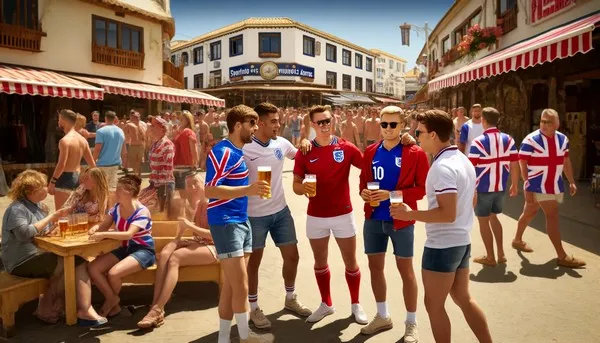Table of Contents
- Key Stereotypical Behaviors
- Historical Context of British Tourism
- British Exceptionalism: Historical Roots and Contemporary Manifestations
- Manifestations of British Exceptionalism in Tourism
- Sociological Implications of British Exceptionalism
- Media Representation and its Role
- Societal Implications and Consequences
- Challenging the Stereotypes
- Conclusion
- Poll
- Think!
- Essay Suggestions
- Research Suggestions
- Further Reading
Tourism, as a social and cultural phenomenon, offers significant insights into the behaviors and perceptions of various groups. Among these, British tourists have garnered a particular reputation that has sparked widespread discussion and analysis. This stereotype, characterized by excessive alcohol consumption, fighting, wearing football shirts, and displaying arrogant behavior, is more than just a cultural caricature. It reflects deeper societal attitudes and historical legacies. This article delves into the sociological underpinnings of these stereotypes, exploring their origins, implications, and connections to the concept of British exceptionalism.
Key Stereotypical Behaviors
Consumption of Alcohol
One of the most prominent stereotypes of British tourists is their propensity for excessive alcohol consumption. This behavior can be traced back to cultural norms within Britain itself, where social drinking is deeply ingrained in everyday life. Pubs and social drinking are central to British social interactions, and this norm is often exported abroad.
Historical and Cultural Context
The British pub culture has evolved over centuries, becoming an integral part of social life. Historically, pubs were community hubs where people gathered not only to drink but to socialize, discuss politics, and even conduct business. This tradition has fostered a normalization of alcohol consumption as a key element of social bonding and leisure activities. The importance of the pub as a social institution in Britain cannot be overstated, and it reflects a broader societal acceptance of drinking as a normative behavior.
Alcohol as a Social Lubricant
In a foreign environment, alcohol serves as a social lubricant, lowering inhibitions and fostering a sense of camaraderie among travelers. However, this often leads to overindulgence, resulting in disruptive behavior that reinforces negative stereotypes. The phenomenon of “binge drinking,” which is prevalent in Britain, finds its manifestation in tourist hotspots, leading to public disorder and conflicts with locals.
Excessive alcohol consumption among British tourists is often a continuation of domestic drinking habits. The “binge drinking” culture in the UK, characterized by the consumption of large quantities of alcohol in a short period, often translates into similar behaviors abroad. This is exacerbated by the holiday atmosphere, where the lack of everyday responsibilities and the desire to have a “good time” can lead to reckless drinking.
Fighting and Public Disorder
Accompanying excessive alcohol consumption is the stereotype of British tourists engaging in fights and public disorder. This behavior is often sensationalized by media reports, creating a narrative of unruly British tourists. Sociologically, this can be understood through the lens of group dynamics and masculinity.
Group Dynamics and Alcohol
In many instances, fighting among British tourists is linked to expressions of masculinity. For young men, particularly those traveling in groups, aggression can be a means of asserting dominance and bonding with peers. This behavior is often exacerbated by alcohol, leading to confrontations with other tourists or locals. The concept of “lad culture,” which emphasizes male bonding through drinking and rowdy behavior, is a significant factor in this stereotype.
“Lad culture” promotes a hyper-masculine ideal where drinking, physical prowess, and risk-taking are valorized. Within this subculture, aggressive behavior is often seen as a demonstration of strength and loyalty to the group. This dynamic is heightened in the context of travel, where the absence of familiar social constraints and the presence of alcohol can lead to increased likelihood of conflicts.
Media Sensationalism
The media plays a crucial role in perpetuating the stereotype of the unruly British tourist. Incidents involving fights and public disorder are often highly publicized, reinforcing a negative image. These reports typically lack context, failing to account for the broader social and cultural factors that contribute to such behavior. The focus on sensational incidents can overshadow the more common, peaceful behaviors of the majority of British tourists, thereby skewing public perception.
Wearing Football Shirts
The image of British tourists wearing football shirts is another enduring stereotype. Football, as a cultural touchstone in Britain, serves as a marker of identity and allegiance. Wearing a football shirt abroad signifies a connection to home and a display of national pride.
Symbolism and Identity
From a sociological perspective, clothing, including football shirts, is a form of non-verbal communication. It signifies belonging to a particular group and expresses identity. For British tourists, football shirts are a way to signal their cultural identity and solidarity with fellow compatriots. However, this can also create a perception of insularity and lack of cultural sensitivity, reinforcing the stereotype of the “loud British tourist.”
Football in Britain is more than just a sport; it is a cultural institution. Supporting a football team involves a deep emotional and social investment, and the team colors and logos become symbols of personal and collective identity. When British tourists wear football shirts abroad, they are not just displaying their support for a team; they are also expressing a sense of belonging and national pride. However, this display can be perceived by others as a lack of interest in engaging with the local culture, thereby reinforcing the stereotype of British insularity.
Arrogant Behavior
Arrogant behavior, often attributed to British tourists, can be linked to historical and cultural factors. The legacy of the British Empire, with its global dominance, has contributed to a sense of exceptionalism that persists in contemporary British society.
Historical Context of British Tourism
Get the full article AD FREE. Join now for full access to all premium articles.
View Plans & Subscribe Already a member? Log in.





